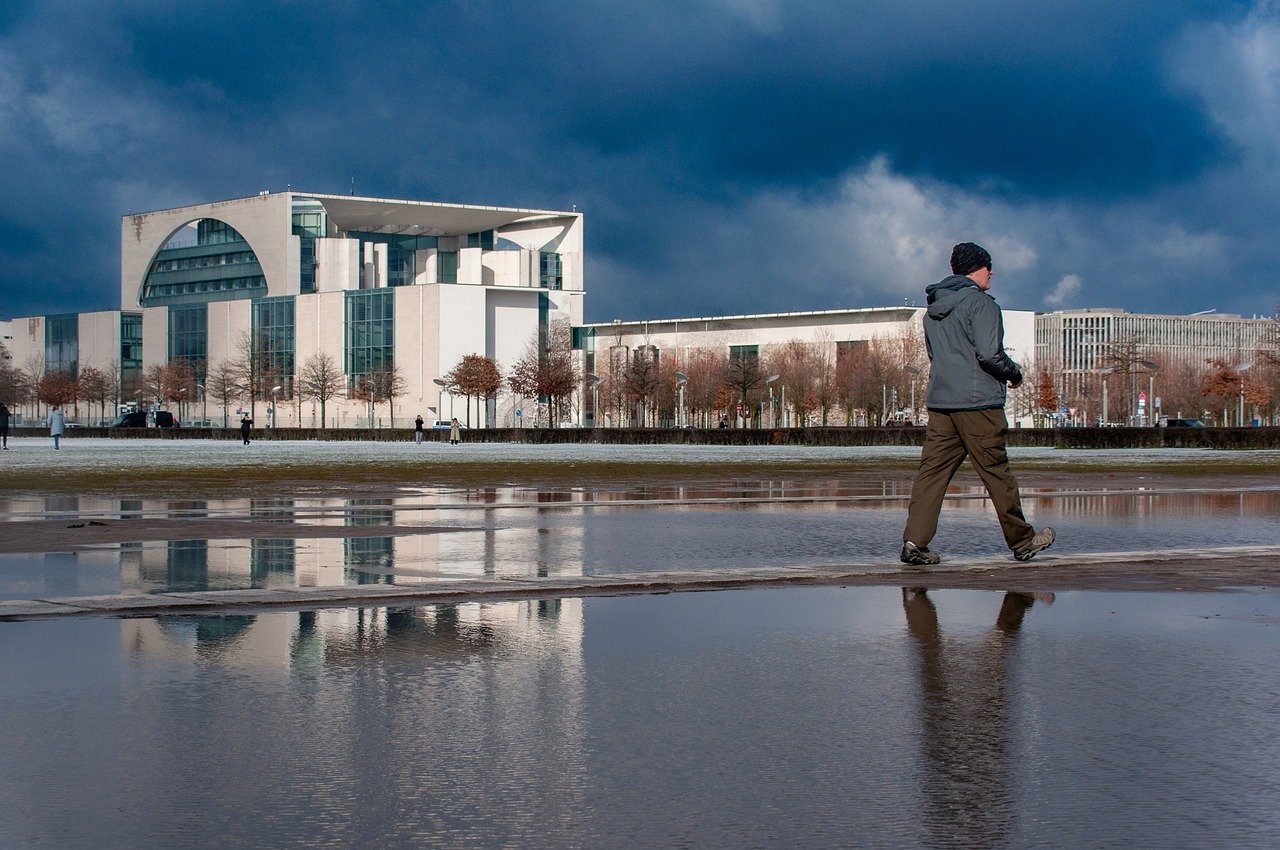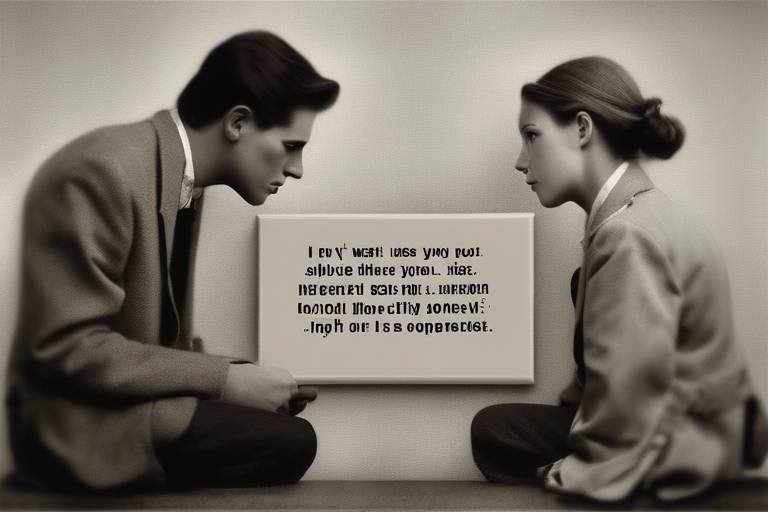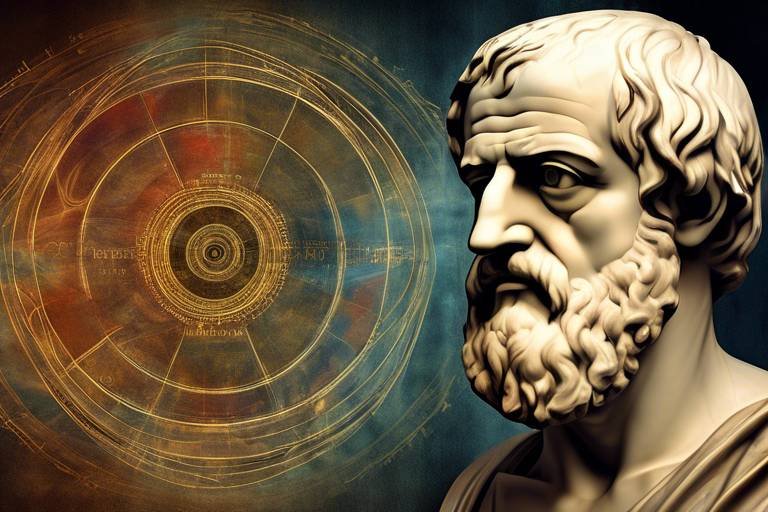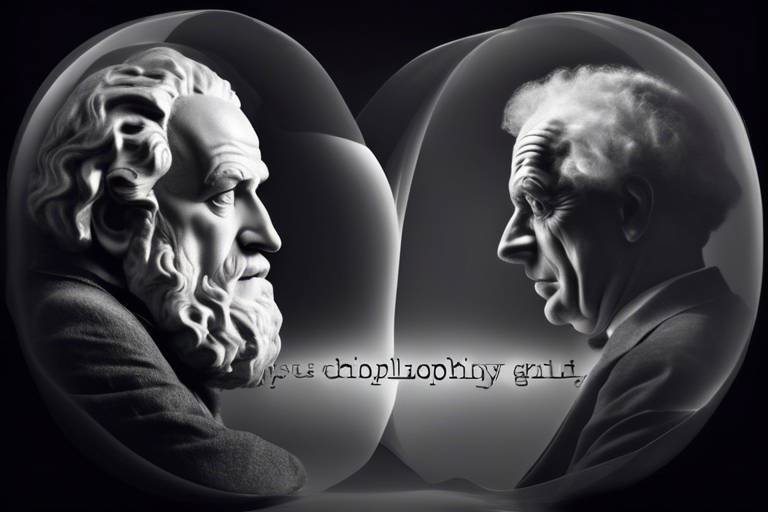Is There a Link Between Philosophy and Politics?
The connection between philosophy and politics is as intricate as a spider's web, with each strand representing a different idea, theory, or historical context that influences the other. At its core, philosophy seeks to answer some of the most profound questions about existence, morality, and the nature of knowledge, while politics deals with the practicalities of governance, power, and societal organization. But how do these two realms intertwine? Can a political system thrive without a philosophical underpinning, or can philosophy exist in a vacuum without political manifestation? These questions are not just academic musings; they are essential for understanding the world we live in today.
Throughout history, philosophers have laid the groundwork for political ideologies, shaping the way societies are structured and governed. Thinkers like Plato and Aristotle pondered the ideal state, while more modern philosophers such as John Locke and Karl Marx provided frameworks that would influence revolutions and reforms across the globe. The historical context is crucial here, as it reveals how ancient ideas have evolved and adapted to meet the needs of contemporary society. For instance, the concept of democracy, which has roots in ancient Greece, has undergone significant transformations, yet it still reflects the philosophical debates of its time about freedom, justice, and the role of the individual in society.
Moreover, the interplay between philosophy and politics is not merely a relic of the past; it is an ongoing dialogue. In today's world, we see philosophical debates shaping political discourse around pressing issues such as climate change, human rights, and globalization. For instance, the ethics of environmental policy raises questions about our responsibility to future generations and the moral implications of our actions today. Similarly, discussions about social justice and equity are deeply rooted in philosophical theories that challenge the status quo and advocate for systemic change.
In essence, understanding the link between philosophy and politics is vital for anyone who wishes to engage with the complexities of modern governance. It allows us to critically evaluate our political systems and the ideologies that underpin them. So, the next time you hear a political debate, consider the philosophical ideas that may be lurking beneath the surface. Are they advocating for the greater good? Are they protecting the rights of individuals? Or are they perpetuating systems of power that benefit only a select few? The answers to these questions may very well shape the future of our societies.

The Historical Context
Understanding the historical context of philosophy and politics is essential for grasping how these two fields intertwine and influence one another. Throughout history, great thinkers have laid the groundwork for modern political systems, providing the intellectual scaffolding that supports contemporary governance. From the ancient Greeks to Enlightenment philosophers, the evolution of political thought has been profoundly shaped by philosophical inquiry.
In ancient Greece, philosophers like Plato and Aristotle explored the nature of justice, the ideal state, and the role of citizens in governance. Plato's vision of a philosopher-king in "The Republic" emphasized the importance of wisdom in leadership, while Aristotle's empirical approach in "Politics" laid the foundation for political science as a discipline. These early ideas not only influenced their contemporaries but also resonated through the ages, impacting political thought during the Renaissance and beyond.
Fast forward to the Enlightenment, where thinkers such as John Locke, Thomas Hobbes, and Jean-Jacques Rousseau revolutionized the concept of governance. Their writings on the social contract and individual rights challenged the divine right of kings and advocated for a government that derives its authority from the consent of the governed. This shift was monumental, paving the way for modern democratic ideologies that prioritize individual freedoms and collective responsibility.
To illustrate the progression of thought, consider the following table that highlights key philosophers and their contributions to political philosophy:
| Philosopher | Key Work | Contribution |
|---|---|---|
| Plato | The Republic | Concept of philosopher-king and ideal state |
| Aristotle | Politics | Empirical analysis of political systems and citizenship |
| John Locke | Two Treatises of Government | Ideas of natural rights and government by consent |
| Thomas Hobbes | Leviathan | Social contract theory emphasizing order and authority |
| Jean-Jacques Rousseau | The Social Contract | Emphasis on general will and popular sovereignty |
As we delve deeper into the interplay between philosophy and politics, it's crucial to recognize that these ideas are not merely academic; they have real-world implications. The principles established by these philosophers have shaped constitutions, influenced revolutions, and guided movements for social change. Today, we continue to grapple with these foundational ideas, as they remain relevant in discussions about governance, rights, and the role of the state in our lives.
In conclusion, the historical context of philosophy and politics reveals a rich tapestry of thought that has evolved over centuries. By examining the contributions of key philosophers, we can better appreciate how their ideas have informed modern political systems and continue to influence contemporary debates. As we move forward in this exploration, we will see how these philosophical theories not only shape political ideologies but also impact the ethical considerations that guide our leaders today.

Key Philosophical Theories
The relationship between philosophy and politics is deeply rooted in various philosophical theories that have shaped political thought throughout history. Among the most influential are utilitarianism and social contract theory. These theories not only provide frameworks for understanding governance but also challenge us to think critically about the implications of political decisions on society. Each theory presents unique insights and dilemmas that resonate in contemporary political discourse.
Utilitarianism, for instance, is a consequentialist theory that advocates for actions that maximize overall happiness. This idea, championed by philosophers such as John Stuart Mill, has had a profound impact on political policies aimed at achieving the greatest good for the greatest number. Imagine a government deciding on healthcare policies: under a utilitarian framework, the focus would be on policies that improve health outcomes for the majority, even if it means sacrificing certain benefits for a minority. This raises a critical question: can the pursuit of the greater good justify actions that may harm individuals or smaller groups?
On the other hand, social contract theory offers a different lens through which to view political authority and individual rights. Articulated by thinkers like Thomas Hobbes, John Locke, and Jean-Jacques Rousseau, this theory posits that the legitimacy of state power derives from an implicit agreement between the governed and those in authority. In essence, citizens consent to surrender some of their freedoms in exchange for protection and order. This theory has been foundational in shaping modern democratic governance, emphasizing the importance of individual rights and the moral obligations of the state.
To better understand these theories, let’s look at a comparative table:
| Theory | Key Proponents | Main Idea | Political Implications |
|---|---|---|---|
| Utilitarianism | John Stuart Mill, Jeremy Bentham | Maximizing overall happiness | Policies that focus on the majority's welfare |
| Social Contract Theory | Thomas Hobbes, John Locke, Jean-Jacques Rousseau | Legitimacy of authority through consent | Emphasis on individual rights and state responsibility |
Both theories present compelling arguments and challenges. While utilitarianism encourages a focus on collective welfare, critics argue that it can lead to ethical dilemmas, particularly when the rights of minorities are overlooked. Conversely, social contract theory emphasizes the importance of individual rights, yet it raises questions about the nature of consent and the extent to which individuals truly agree to the terms set by their governments.
Ultimately, these key philosophical theories are not just academic concepts; they are alive in our political systems and discussions today. They invite us to reflect on our values and the kind of society we wish to build. As we navigate complex political landscapes, understanding these philosophical underpinnings can empower us to engage more thoughtfully in civic life.

Utilitarianism and Governance
Utilitarianism, a philosophical doctrine that emerged prominently in the 19th century, is primarily associated with the works of John Stuart Mill and Jeremy Bentham. At its core, this theory posits that the best action is the one that maximizes overall happiness or utility. In the realm of governance, utilitarian principles serve as a guiding framework for policymakers, compelling them to prioritize the greatest good for the greatest number of people. This approach can be likened to a balancing act on a seesaw; policymakers strive to ensure that their decisions tip the scales towards the collective well-being, rather than favoring a select few.
In practical terms, utilitarianism influences various aspects of governance, including healthcare policies, economic regulations, and social welfare programs. For instance, when a government decides to allocate resources for public health initiatives, it often evaluates the potential outcomes based on how many lives could be saved or how many people could benefit from improved healthcare services. This decision-making process embodies the utilitarian ethos, aiming to enhance societal welfare while minimizing harm.
However, the application of utilitarianism in governance is not without its challenges. While the theory advocates for actions that lead to the greatest happiness, it can sometimes lead to morally questionable decisions. For example, a government might justify sacrificing the rights or well-being of a minority group if it results in a net increase in happiness for the majority. This raises critical ethical concerns and highlights the tension between utilitarianism and other moral philosophies that prioritize individual rights and justice.
To illustrate the impact of utilitarianism on governance, consider the following table that outlines its advantages and disadvantages:
| Advantages | Disadvantages |
|---|---|
|
|
Ultimately, the integration of utilitarian principles into governance reflects a broader philosophical debate about the role of ethics in political decision-making. As societies evolve and face new challenges, the application of utilitarianism will continue to be scrutinized, urging leaders to strike a balance between the greater good and the protection of individual rights. This ongoing dialogue not only shapes policies but also influences public perception and trust in governance.
As we navigate the complexities of modern governance, it is essential to ask ourselves: How do we ensure that the pursuit of happiness does not come at the expense of justice? The interplay between utilitarianism and governance remains a vital area of exploration, prompting us to rethink our approach to political ethics and the responsibilities of those in power.
- What is utilitarianism? Utilitarianism is a philosophical theory that suggests that the best action is the one that maximizes overall happiness or utility.
- Who are the key figures in utilitarianism? The most notable figures include John Stuart Mill and Jeremy Bentham, who significantly contributed to the development of this theory.
- How does utilitarianism influence governance? Utilitarianism influences governance by guiding policymakers to make decisions that aim to achieve the greatest good for the greatest number of people.
- What are the criticisms of utilitarianism in politics? Critics argue that utilitarianism can justify unethical actions against minorities and that it struggles to measure happiness accurately.

Critiques of Utilitarianism
While utilitarianism presents a compelling framework for evaluating the morality of actions based on their outcomes, it is not without its fair share of critiques. One of the most significant criticisms is that it can lead to ethical dilemmas where the rights of individuals are sacrificed for the sake of the majority. Imagine a scenario where a government decides to implement a policy that benefits a large population but disproportionately harms a small minority. In this case, utilitarianism could justify the harm inflicted on that minority, raising serious moral questions about justice and fairness.
Moreover, critics argue that utilitarianism fails to account for the complexity of human values. Happiness, as defined by utilitarianism, is often subjective and varies greatly among individuals. What brings joy to one person might cause distress to another. This subjectivity makes it challenging to measure and compare happiness across different people, leading to potential inconsistencies in policy-making. For instance, if a policy is designed to maximize happiness for the majority but overlooks the suffering of a minority, it could be seen as fundamentally flawed.
Another critique revolves around the issue of predictability. Utilitarianism relies heavily on the ability to predict the consequences of actions accurately. However, in real-world scenarios, outcomes can be unpredictable and complex. This unpredictability raises questions about how policymakers can justifiably claim to act in the best interest of the greater good when the future is uncertain. For example, a policy aimed at economic growth might lead to unforeseen environmental damage, contradicting the initial intention of maximizing overall well-being.
Additionally, utilitarianism is often criticized for its potential to justify immoral actions. If the end justifies the means, then actions that are typically considered wrong—such as lying, coercion, or even violence—could be deemed acceptable if they lead to a greater overall happiness. This perspective can create a slippery slope where unethical practices become normalized under the guise of utilitarianism. For instance, some might argue that surveillance programs designed to enhance public safety are justified by the happiness they bring to the larger community, despite infringing on individual privacy rights.
In summary, while utilitarianism contributes significantly to political thought and decision-making, its critiques highlight the need for a more nuanced approach that considers individual rights, the complexity of human values, and the unpredictability of outcomes. As we navigate the intricate landscape of governance and ethics, it’s crucial to balance the desire for the greater good with a commitment to justice and fairness for all.
- What is utilitarianism? Utilitarianism is a philosophical theory that suggests actions are right if they promote the greatest happiness for the greatest number of people.
- What are the main critiques of utilitarianism? Critics argue that it can justify harmful actions against minorities, oversimplifies human values, relies on unpredictable outcomes, and may condone immoral actions.
- How does utilitarianism influence political decision-making? Utilitarian principles often guide policies aimed at maximizing overall societal welfare, such as healthcare and economic policies.

Utilitarianism in Practice
Utilitarianism, a philosophical doctrine that advocates for actions that maximize overall happiness, is not just a theoretical concept; it finds its way into the fabric of our everyday governance. Think about it: when policymakers sit down to draft laws or regulations, they're often weighing the potential benefits against the costs. This balancing act is a practical application of utilitarian principles. For instance, consider healthcare policies that aim to provide the greatest good for the greatest number. These decisions are inherently utilitarian, as they seek to enhance the well-being of the majority while making tough choices about resource allocation.
In practice, utilitarianism manifests in various domains, including economics, public health, and social welfare. Take the example of public health initiatives aimed at controlling infectious diseases. By vaccinating a population, the government not only protects individuals but also ensures community immunity, thereby maximizing societal welfare. The underlying rationale is simple: the well-being of the many outweighs the discomfort of the few who may experience side effects from the vaccine. This is a classic utilitarian approach, where the overall benefit justifies the individual costs.
Moreover, utilitarianism influences environmental policies as well. When governments decide to implement regulations aimed at reducing carbon emissions, they are often motivated by the long-term benefits of a healthier planet. This involves complex calculations of potential outcomes, weighing the immediate economic costs against the future benefits of a sustainable environment. A recent study highlighted in the table below illustrates how different policies can lead to varying levels of happiness based on utilitarian principles:
| Policy | Short-Term Cost | Long-Term Benefit | Overall Happiness Impact |
|---|---|---|---|
| Carbon Tax | $100 million | $1 billion (reduced health costs) | High |
| Renewable Energy Subsidies | $50 million | $500 million (job creation) | Moderate |
| Deforestation Ban | $20 million | $300 million (biodiversity preservation) | High |
In addition to these examples, utilitarianism also plays a crucial role in the realm of economics. Policies that stimulate economic growth, such as tax cuts or infrastructure spending, are often justified on the grounds that they will lead to greater overall happiness by creating jobs and increasing the standard of living. However, these decisions are not without controversy. Critics argue that the focus on the majority can lead to neglecting minority rights and interests, highlighting a significant ethical dilemma within the utilitarian framework.
Ultimately, the application of utilitarianism in politics is a double-edged sword. While it provides a clear framework for decision-making aimed at maximizing happiness, it also raises challenging questions about whose happiness counts and how we measure it. As we continue to navigate complex social issues, understanding the practical implications of utilitarianism will be crucial for policymakers and citizens alike.
- What is utilitarianism? Utilitarianism is a philosophical theory that suggests that the best action is the one that maximizes overall happiness or utility.
- How does utilitarianism influence political decisions? Utilitarianism influences political decisions by encouraging policymakers to consider the overall benefits and costs of their actions, often prioritizing the well-being of the majority.
- What are some criticisms of utilitarianism? Critics argue that utilitarianism can justify harmful actions against minorities for the sake of the majority, and it may oversimplify complex moral situations.
- Can utilitarianism be applied in all areas of governance? While utilitarianism can provide valuable insights, its application may vary depending on the ethical considerations and specific context of each situation.

Social Contract Theory
Social contract theory is a fascinating framework that delves into the origins of political authority and the legitimacy of state power. It suggests that governments derive their authority from an implicit agreement among the governed. Think of it as a grand handshake between the rulers and the ruled, where both parties agree to certain terms to ensure a stable society. This idea has been articulated by several prominent philosophers, including Thomas Hobbes, John Locke, and Jean-Jacques Rousseau, each offering unique perspectives on the nature of this contract and its implications for individual rights and state power.
At its core, social contract theory addresses a fundamental question: Why do we obey the laws of the state? Hobbes, in his work Leviathan, argued that in a state of nature, life would be "solitary, poor, nasty, brutish, and short." To escape this chaos, individuals consent to surrender some of their freedoms to a sovereign authority, which, in return, provides order and protection. This concept emphasizes the necessity of a strong central authority to maintain peace and prevent anarchy.
In contrast, Locke’s interpretation of the social contract is more optimistic. He believed that individuals possess inherent rights to life, liberty, and property, and that the government's role is to protect these rights. If the government fails to do so, Locke argued that citizens have the right to revolt. This idea laid the groundwork for modern democratic principles, emphasizing the importance of consent and the right to challenge authority.
Rousseau took a different approach, positing that the social contract should be based on the collective will of the people, which he termed the "general will." He believed that true freedom is found in participating in the formation of the laws that govern us. According to Rousseau, individuals achieve moral and political freedom by being part of a community that collectively determines its rules, rather than being subjected to the will of a monarch or ruling class.
Overall, social contract theory has profound implications for contemporary governance. It raises critical questions about the balance between authority and individual rights, the legitimacy of political power, and the responsibilities of citizens. In today’s world, where political discontent and calls for reform are prevalent, revisiting these philosophical foundations can provide valuable insights into the nature of our political systems.
To illustrate the differing views of these philosophers, here’s a brief comparison:
| Philosopher | View on State of Nature | Government Role | Right to Revolt |
|---|---|---|---|
| Thomas Hobbes | Chaotic and violent | Absolute authority for peace | No |
| John Locke | State of equality with rights | Protector of rights | Yes |
| Jean-Jacques Rousseau | Corrupted by society | Reflects general will | Yes, for the common good |
In conclusion, social contract theory not only provides a historical lens through which we can examine the evolution of political thought but also prompts us to consider our own roles within society. Are we merely subjects of the state, or do we have a say in shaping the laws that govern us? This ongoing dialogue between philosophy and politics remains as relevant today as it was in the past, urging us to reflect on the social contracts we enter into in our daily lives.
- What is social contract theory? - It is a philosophical concept that explores the legitimacy of state authority based on an implicit agreement among individuals to form a society.
- Who are the key philosophers associated with social contract theory? - Major figures include Thomas Hobbes, John Locke, and Jean-Jacques Rousseau.
- How does social contract theory apply to modern governance? - It raises questions about individual rights, the role of government, and the legitimacy of political power.
- Can citizens challenge government authority according to social contract theory? - Yes, particularly in Locke’s and Rousseau’s interpretations, where citizens have the right to revolt if their rights are not protected.

The Role of Ethics in Politics
Ethics is the backbone of politics, a guiding force that helps navigate the murky waters of governance and public service. Without a solid ethical foundation, political leaders and institutions can easily veer off course, leading to corruption, injustice, and a loss of public trust. But what does it mean to be ethical in politics? In essence, it involves making decisions that align with moral values and societal norms, ensuring that the welfare of the populace is at the forefront of every action.
Political ethics encompasses a variety of principles that govern the behavior of politicians. These principles emphasize accountability, transparency, and the public good. Imagine a ship sailing through stormy seas; the ethical principles act as the compass, guiding leaders towards safe harbors where they can serve the community effectively. When leaders prioritize ethical considerations, they not only enhance their own credibility but also foster a culture of integrity within their administrations.
Moreover, ethical decision-making is not just about avoiding wrongdoing; it’s about actively promoting fairness and justice. For example, consider a situation where a government has to allocate limited resources. An ethical approach would involve prioritizing the needs of the most vulnerable populations, ensuring that no one is left behind. This is where ethics intersects with policies, shaping decisions that can have profound implications on society.
However, the path of political ethics is fraught with challenges. Politicians often face pressure from various stakeholders, including lobbyists, party members, and constituents, which can lead to conflicts between personal values and public expectations. In such cases, the ability to remain steadfast in one’s ethical beliefs becomes crucial. It’s a balancing act, akin to walking a tightrope, where one misstep can lead to a fall from grace.
To illustrate the complexities of political ethics, let’s take a closer look at some real-world examples. For instance, during the Watergate scandal, the ethical lapses of political leaders resulted in a crisis of confidence among the American public. This incident not only highlighted the need for accountability but also spurred reforms aimed at increasing transparency in government operations. Similarly, contemporary issues like campaign finance reform continue to raise ethical questions about the influence of money in politics.
In conclusion, the role of ethics in politics cannot be overstated. It serves as a critical framework for guiding leaders in their decision-making processes, ensuring that they act in the best interests of their constituents. As we navigate the complexities of modern governance, the importance of maintaining ethical standards remains paramount. After all, a society that values ethical leadership is one that fosters trust, engagement, and ultimately, progress.
- What is political ethics? Political ethics refers to the principles that govern the conduct of politicians and public officials, emphasizing accountability, transparency, and the public good.
- Why is ethics important in politics? Ethics is crucial in politics as it guides leaders in making decisions that reflect moral values and societal norms, helping to build trust and integrity within governance.
- How can ethical dilemmas impact political decisions? Ethical dilemmas can create conflicts between personal values and public expectations, making it challenging for politicians to navigate their responsibilities effectively.

Political Ethics
Political ethics is a fascinating field that dives deep into the moral principles guiding the actions of politicians and policymakers. It's not just about what laws are enacted or how policies are formed; it’s about the **values** and **principles** that underpin those decisions. In a world where political scandals seem to dominate the headlines, understanding political ethics becomes crucial. It serves as a compass for leaders, steering them towards accountability, transparency, and a commitment to the public good.
At its core, political ethics challenges us to ask profound questions: What is the right thing to do in a position of power? How should leaders balance personal interests with the needs of their constituents? The answers to these questions can vary widely, influenced by cultural norms, societal expectations, and individual beliefs. Political ethics is not just theoretical; it has real-world implications that can affect millions of lives.
One of the key aspects of political ethics is the concept of **accountability**. Politicians are entrusted with power, and with that power comes the responsibility to act in the best interests of the public. This means being answerable for their actions and decisions. When leaders fail to uphold ethical standards, it can lead to a loss of trust among the populace, resulting in political instability and disillusionment. In fact, a recent study indicated that over 70% of citizens believe that ethical behavior is essential for effective governance.
Moreover, political ethics emphasizes the importance of **transparency**. Citizens have the right to know how decisions are made and how resources are allocated. Transparency fosters trust and encourages civic engagement. When leaders operate in the shadows, it raises suspicions and can lead to corruption. For instance, consider the following table that outlines the potential consequences of a lack of transparency in governance:
| Consequence | Description |
|---|---|
| Corruption | When leaders are not transparent, it opens the door to unethical practices, leading to corruption. |
| Civic Disengagement | Lack of trust in government can result in lower voter turnout and apathy among citizens. |
| Policy Failure | Without public input and scrutiny, policies may fail to address the needs of the community. |
Additionally, political ethics is not static; it evolves with society. As new challenges arise—be it in technology, environmental issues, or social justice—so too must our ethical frameworks adapt. For instance, the rise of social media has transformed how politicians communicate with the public, necessitating new ethical guidelines around misinformation and digital privacy. The dynamic nature of political ethics ensures that it remains relevant and responsive to the changing political landscape.
In conclusion, political ethics is a vital component of governance that shapes the relationship between leaders and the public. It reminds us that power should be wielded responsibly and that ethical considerations must guide decision-making. As citizens, it is our responsibility to hold our leaders accountable and demand transparency, ensuring that political ethics remains at the forefront of our democratic processes.
- What is political ethics? Political ethics refers to the moral principles that govern the actions and decisions of politicians and public officials.
- Why is accountability important in politics? Accountability ensures that leaders are answerable for their actions, fostering trust and integrity in governance.
- How does transparency affect public trust? Transparency allows citizens to see how decisions are made, which builds trust and encourages civic engagement.
- Can political ethics change over time? Yes, political ethics can evolve to address new societal challenges and changes in public expectations.

Case Studies in Political Ethics
When delving into the realm of political ethics, examining real-world case studies can illuminate the complexities and challenges that leaders face in upholding ethical standards. One prominent example is the Watergate scandal, which rocked the United States in the 1970s. This political debacle not only revealed the extent of corruption within the Nixon administration but also sparked a national conversation about accountability and transparency in government. The scandal ultimately led to President Nixon's resignation, showcasing how ethical breaches can have profound implications for political leadership and public trust.
Another significant case study is the ethical dilemmas faced by politicians during the COVID-19 pandemic. Many leaders were forced to make decisions that weighed public health against economic stability. For instance, some governments opted for strict lockdown measures to curb the virus's spread, while others prioritized keeping the economy afloat, leading to heated debates about the moral responsibilities of leadership. The varying responses highlighted the intricate balance between ethical considerations and practical governance, prompting discussions about the role of ethics in crisis management.
Furthermore, the ethical implications of foreign policy decisions can also serve as a rich ground for analysis. Take, for example, the United States' involvement in the Iraq War. The justification for military action was framed around the idea of promoting democracy and protecting human rights. However, as the war dragged on, questions arose about the ethicality of the invasion, especially concerning civilian casualties and the long-term impact on the region. This case illustrates how political leaders must navigate the murky waters of ethics when making decisions that affect not just their nation but the global community.
In addition to these high-profile examples, there are countless local and international instances where political ethics come into play. For instance, the ethical considerations surrounding campaign financing have become increasingly relevant as money plays a crucial role in political campaigns. The Citizens United v. FEC case in the United States raised significant questions about the influence of money on politics and whether it undermines the democratic process. The ruling allowed for unlimited independent expenditures by corporations and unions, leading to concerns about the potential for corruption and the erosion of public trust in political systems.
To further illustrate the diversity of ethical dilemmas in politics, the following table summarizes several case studies and their ethical implications:
| Case Study | Ethical Dilemma | Outcome |
|---|---|---|
| Watergate Scandal | Corruption and abuse of power | Resignation of President Nixon |
| COVID-19 Response | Public health vs. economic stability | Varied responses, ongoing debates |
| Iraq War | Human rights vs. national security | Long-term regional instability |
| Citizens United v. FEC | Campaign financing and democracy | Increased influence of money in politics |
These case studies reveal that political ethics is not just an abstract concept but a vital aspect of governance that affects real lives. By examining such instances, we can better understand the importance of ethical decision-making in politics and the potential consequences of failing to uphold these standards. As we continue to navigate an increasingly complex political landscape, the lessons learned from these case studies will be essential in shaping the future of political ethics.
- What is political ethics? Political ethics refers to the principles that guide the conduct of politicians and public officials, emphasizing accountability, transparency, and the public good.
- Why are case studies important in political ethics? Case studies provide real-world examples that illustrate the complexities and challenges of ethical decision-making in politics.
- How can political ethics impact public trust? Ethical breaches can lead to a loss of trust in political leaders and institutions, highlighting the importance of maintaining high ethical standards.
- What are some common ethical dilemmas in politics? Common dilemmas include issues related to campaign financing, corruption, public health decisions, and foreign policy actions.

Philosophy's Influence on Political Movements
Philosophical ideas have been the driving force behind numerous political movements throughout history, acting as both a catalyst for change and a framework for understanding societal issues. The relationship between philosophy and politics is akin to a dance; each influences the other, creating a rhythm that can either uplift a society or lead it astray. From the civil rights movement to feminism, philosophical concepts have provided the necessary tools for activists to challenge the status quo and advocate for justice.
Consider the civil rights movement, which was heavily influenced by the philosophical notions of justice and equality. Thinkers like John Rawls and Martin Luther King Jr. drew upon these concepts to argue against systemic racism and advocate for a more equitable society. The philosophical underpinnings of this movement were not just theoretical; they served as a rallying cry that galvanized individuals from all walks of life to unite against oppression. The idea that "injustice anywhere is a threat to justice everywhere" resonates deeply with the ethical frameworks established by philosophers throughout history.
Similarly, feminist philosophy has critically examined existing power structures, challenging the traditional narratives that have often marginalized women's voices. Philosophers such as Simone de Beauvoir and Judith Butler have provided profound insights into gender and identity, influencing political discourse and policies aimed at achieving gender equality and social justice. Their work encourages us to question not only the laws that govern us but also the societal norms that shape our perceptions of gender roles.
This influence of philosophy on political movements can also be seen in the realm of environmental activism. Philosophers like Arne Naess and Aldo Leopold have emphasized the moral relationship between humans and nature, advocating for a more sustainable approach to governance. Their ideas have inspired movements aimed at combating climate change, illustrating how philosophical thought can inform political action and policy-making. The ethical considerations surrounding environmental issues are now more crucial than ever, as we face a global crisis that requires both philosophical reflection and political will.
In essence, the interplay between philosophy and political movements is not just a historical curiosity; it is a vital aspect of our ongoing struggle for justice and equality. Philosophical ideas provide a lens through which we can examine our world, offering insights that challenge us to think critically about our values and actions. Whether through the lens of civil rights, feminism, or environmentalism, philosophy continues to inspire and shape the movements that strive for a better future.
- How does philosophy influence political movements?
Philosophy provides the foundational ideas that inspire and guide political movements, helping activists articulate their goals and principles. - Can you give examples of philosophical influences on specific movements?
Sure! The civil rights movement was influenced by concepts of justice and equality, while feminist movements have drawn from feminist philosophy to challenge gender norms. - Why is it important to consider philosophy in political discourse?
Philosophy encourages critical thinking and ethical reflection, which are essential for making informed political decisions and advocating for social change.

Philosophy and Civil Rights
The civil rights movement, which emerged as a powerful force in the mid-20th century, was profoundly influenced by philosophical concepts of justice, equality, and human dignity. Thinkers like John Rawls and Martin Luther King Jr. drew upon philosophical ideas to articulate the need for systemic change in society. At its core, the movement was not merely a political struggle; it was a profound moral quest, seeking to align the laws of the land with the ethical principles of fairness and equality.
Philosophy provided a framework for understanding the injustices faced by marginalized groups. For instance, the concept of natural rights posits that all individuals are entitled to certain inalienable rights simply by being human. This notion was pivotal in arguing against discriminatory practices that denied individuals their basic freedoms. Activists often referenced these philosophical ideas to challenge the status quo, demanding that society recognize and uphold the inherent dignity of every person.
Moreover, the philosophical discourse surrounding civil rights emphasized the importance of nonviolent resistance. Leaders like Dr. King were heavily influenced by the teachings of Mahatma Gandhi, which were rooted in ethical philosophy. They believed that love and understanding could triumph over hate and oppression, a stance that resonated deeply with the moral imperatives of justice and equality. This approach not only highlighted the ethical dimensions of the struggle but also helped to galvanize public support across diverse communities.
To illustrate the connections between philosophy and civil rights, consider the following table that outlines key philosophical concepts and their impact on the movement:
| Philosophical Concept | Influence on Civil Rights Movement |
|---|---|
| Natural Rights | Justification for equal treatment and the fight against discriminatory laws. |
| Social Justice | Framing the civil rights struggle as a moral obligation to create a fair society. |
| Nonviolent Resistance | Promoting ethical protests and civil disobedience as means to achieve change. |
| Equality | Highlighting the need for equal opportunities and rights for all individuals. |
In conclusion, the interplay between philosophy and civil rights is a testament to the power of thought in shaping societal change. Philosophical ideas not only provided the theoretical underpinning for the movement but also inspired countless individuals to stand up for justice and equality. As we reflect on the achievements of the civil rights movement, it is essential to recognize the enduring influence of these philosophical principles in our ongoing quest for a more just society.
- What role did philosophy play in the civil rights movement?
Philosophy provided the moral framework and justification for the movement's goals, emphasizing concepts like justice, equality, and human dignity. - Who were some key philosophers that influenced civil rights leaders?
Philosophers like John Rawls and moral leaders such as Martin Luther King Jr. were influential in articulating the ethical dimensions of the struggle for civil rights. - How did nonviolent resistance relate to philosophical teachings?
Nonviolent resistance, inspired by Gandhi's teachings, was rooted in ethical philosophy, emphasizing love and understanding over violence in the pursuit of justice.

Feminist Philosophy and Politics
Feminist philosophy has profoundly shaped political discourse, challenging traditional power structures and advocating for the rights and recognition of women in society. At its core, feminist philosophy seeks to interrogate the assumptions underlying gender roles and to bring to light the systemic inequalities that persist in political systems around the world. By examining how gender intersects with other social categories like race, class, and sexuality, feminist thinkers have illuminated the complexities of identity and oppression, paving the way for more inclusive political theories and practices.
One of the most significant contributions of feminist philosophy to politics is its emphasis on justice and equality. Feminist theorists argue that true justice cannot be achieved without addressing the unique challenges faced by women and marginalized groups. This perspective has led to the development of policies aimed at dismantling systemic barriers, promoting gender equality, and ensuring that women's voices are heard in political arenas. For instance, feminist political movements have pushed for reforms in areas such as reproductive rights, workplace equality, and anti-discrimination laws, demonstrating how philosophical ideas can translate into tangible political action.
Moreover, feminist philosophy critiques the traditional political theories that often exclude women's experiences. Thinkers like Simone de Beauvoir and Judith Butler have argued that many political ideologies fail to account for the lived realities of women, thereby perpetuating gender bias. This critique has prompted a re-evaluation of political concepts such as citizenship, autonomy, and justice, urging policymakers to consider how these ideas are experienced differently by various genders. The result is a more nuanced understanding of political participation and representation, one that acknowledges the diverse experiences of all individuals.
To illustrate the impact of feminist philosophy on politics, consider the following key areas where these ideas have made significant inroads:
- Policy Changes: Feminist movements have successfully lobbied for legislative changes that protect women's rights, such as the Violence Against Women Act in the United States.
- Representation: There is a growing recognition of the need for more women in political leadership roles, leading to initiatives aimed at increasing female representation in government.
- Intersectionality: Feminist philosophy has introduced the concept of intersectionality, which examines how overlapping social identities affect experiences of oppression and privilege, influencing contemporary political discussions about inclusivity.
In conclusion, feminist philosophy not only critiques existing political structures but actively participates in shaping a more equitable society. By advocating for the inclusion of diverse perspectives and experiences, feminist thinkers challenge us to reconsider our understanding of justice and equality in politics. As we move forward, the influence of feminist philosophy will likely continue to grow, pushing for systemic changes that reflect a commitment to fairness and inclusivity. This ongoing dialogue between feminist thought and political action remains crucial in the pursuit of a just society for all.
- What is feminist philosophy? Feminist philosophy is a branch of philosophy that examines the ways in which gender influences our understanding of knowledge, reality, and ethics, often focusing on issues of inequality and justice.
- How does feminist philosophy impact politics? It impacts politics by advocating for policies that promote gender equality, critiquing traditional political theories that exclude women's experiences, and pushing for greater representation in political decision-making.
- Who are some key feminist philosophers? Some key figures include Simone de Beauvoir, Judith Butler, bell hooks, and Martha Nussbaum, each contributing significantly to discussions on gender and politics.
- What is intersectionality? Intersectionality is a concept developed by feminist theorists that explores how various social identities (such as race, gender, and class) intersect and contribute to unique experiences of oppression and privilege.

Contemporary Philosophical Debates
In today's fast-paced world, are more relevant than ever. The intersection of philosophy and politics is constantly evolving, addressing pressing issues such as globalization, environmental ethics, and the impact of technology on society. These debates challenge us to reconsider our values and beliefs in light of new realities. Have you ever thought about how our interconnected world affects our moral obligations? Or how technological advancements can reshape our understanding of community and individual rights? These questions lie at the heart of modern philosophical discourse.
One of the most significant areas of discussion is globalization and ethics. As nations become increasingly interconnected, the ethical implications of this phenomenon come to the forefront. Philosophers are grappling with questions about national sovereignty and cultural identity. For instance, does globalization dilute local cultures? Or does it foster a richer, more diverse global culture? These questions are not just academic; they have real-world implications for policy-making and international relations. The table below summarizes some key ethical considerations in the context of globalization:
| Ethical Consideration | Description |
|---|---|
| Cultural Homogenization | The fear that globalization will lead to a loss of unique cultural identities. |
| Economic Inequality | The potential for globalization to exacerbate wealth disparities between nations and within societies. |
| Environmental Impact | How global trade and commerce affect environmental sustainability and local ecosystems. |
Another vital area of contemporary philosophical debate is environmental philosophy. This branch of philosophy examines the moral relationship between humans and nature, questioning how our actions impact the environment. As climate change becomes an undeniable reality, the need for ethical frameworks guiding our relationship with the planet has never been more pressing. Philosophers are exploring concepts such as anthropocentrism (human-centered ethics) versus ecocentrism (nature-centered ethics), challenging us to think critically about our responsibilities towards the environment. For example, should we prioritize human needs over ecological integrity, or should we seek a balance that respects both? The answers to these questions could shape future environmental policies and practices.
Moreover, technology's rapid advancement raises philosophical questions about privacy, autonomy, and the nature of reality itself. As we navigate through an increasingly digital landscape, issues surrounding surveillance, data privacy, and artificial intelligence become paramount. Are we sacrificing our autonomy for convenience? Is our understanding of reality being manipulated by digital platforms? These are not just philosophical musings; they have tangible implications for our lives and governance. Engaging with these debates encourages us to think critically about how technology shapes our values and societal structures.
In summary, contemporary philosophical debates are not merely academic exercises; they are essential discussions that influence our political landscape and societal norms. By engaging with these issues, we can better understand the complexities of our world and the ethical frameworks that guide our actions. Are you ready to dive deeper into these debates and explore how they may shape our future?
- What is the significance of contemporary philosophical debates?
Contemporary philosophical debates are crucial as they help us navigate complex issues that affect our society, such as ethics in globalization and technology. - How does globalization impact ethical considerations?
Globalization raises questions about cultural identity, economic inequality, and environmental sustainability, prompting us to rethink our moral obligations. - What role does environmental philosophy play in today's society?
Environmental philosophy examines our moral relationship with nature, influencing debates on climate change and sustainable practices. - How does technology challenge our philosophical understanding?
Technology raises questions about privacy, autonomy, and the nature of reality, impacting our values and societal norms.

Globalization and Ethics
In today’s interconnected world, globalization is not just a buzzword; it's a reality that affects every aspect of our lives. As nations become more intertwined through trade, technology, and cultural exchange, the ethical implications of these connections come to the forefront. What does it mean to be a global citizen? This question is pivotal as we navigate the complexities of globalization. Philosophers and ethicists are increasingly scrutinizing how our actions in one corner of the globe can have far-reaching consequences in another. For instance, the environmental policies of a developed nation can significantly impact the livelihoods of communities in developing countries.
One of the primary ethical concerns surrounding globalization is the concept of national sovereignty. As countries become more dependent on each other, the idea of a nation acting independently becomes blurred. This raises questions such as: Who is accountable when decisions made in one country adversely affect another? The ethical responsibility of multinational corporations also comes into play. Companies often exploit cheaper labor in developing nations, raising serious moral issues about workers' rights and fair wages.
Moreover, globalization challenges cultural identities. As Western ideals permeate societies worldwide, local traditions can be overshadowed. This phenomenon leads to a cultural homogenization that many argue is detrimental to the rich tapestry of human experience. Ethicists are asking: How do we balance the benefits of global interconnectedness with the preservation of cultural diversity?
To better understand these ethical dilemmas, consider the following table that outlines some of the key ethical questions posed by globalization:
| Issue | Ethical Questions |
|---|---|
| Labor Rights | Are multinational corporations exploiting workers in developing countries? |
| Environmental Impact | How do we hold nations accountable for environmental degradation caused by global trade? |
| Cultural Identity | What measures can be taken to preserve local cultures in a globalized world? |
As we ponder these questions, it's crucial to recognize that the ethical landscape of globalization is not black and white. It requires a nuanced understanding of the interconnectedness of our actions. For instance, while globalization can lead to economic growth, it can also exacerbate inequalities. The challenge lies in finding a balance that promotes both global cooperation and respect for individual rights and cultural identities.
In conclusion, the relationship between globalization and ethics is complex and multifaceted. As we continue to engage with the global community, we must remain vigilant and proactive in addressing these ethical concerns. The choices we make today will shape the world of tomorrow, and it's our responsibility to ensure that those choices reflect our shared values of justice, equity, and respect for all cultures.
- What is globalization? Globalization refers to the process of increased interconnectedness among countries, driven by trade, investment, technology, and cultural exchange.
- How does globalization affect local cultures? Globalization can lead to cultural homogenization, where local traditions and customs may be overshadowed by dominant cultures.
- What are the ethical concerns of globalization? Key concerns include labor rights, environmental impact, and the preservation of cultural identities.
- How can we address the ethical issues of globalization? By promoting fair trade practices, supporting local economies, and respecting cultural diversity, we can mitigate the negative impacts of globalization.

Environmental Philosophy
Environmental philosophy is an intriguing field that delves into the moral relationship between humans and the natural world. As we navigate through a rapidly changing environment, this branch of philosophy challenges us to reconsider our values and responsibilities towards nature. Think of it as a wake-up call, urging us to recognize that our actions have profound implications not only for ourselves but for the entire planet. The questions it raises are both fundamental and pressing: How do we measure our impact on the environment? What ethical obligations do we have to future generations? And, importantly, how do we balance economic development with ecological sustainability?
At its core, environmental philosophy seeks to answer these questions by examining various ethical frameworks. For instance, some philosophers advocate for an anthropocentric view, which prioritizes human interests, while others promote an ecocentric perspective that values all living beings and ecosystems equally. This shift in thinking is crucial, especially as we face global challenges like climate change, biodiversity loss, and pollution. By understanding our place within the larger ecological system, we can begin to forge a path towards a more sustainable future.
One of the most significant contributions of environmental philosophy is its ability to inform political debates and policies. For example, consider the following key concepts that often emerge in discussions about environmental ethics:
- Sustainability: The idea that we must meet our needs without compromising the ability of future generations to meet theirs.
- Interconnectedness: Recognizing that all life forms are interconnected and that our actions can have far-reaching consequences.
- Justice: Addressing the ethical implications of environmental degradation, particularly how it disproportionately affects marginalized communities.
These concepts not only enrich our understanding of environmental issues but also provide a framework for developing policies that promote ecological health. For instance, when crafting legislation on climate change, policymakers can draw on principles from environmental philosophy to ensure that their decisions are rooted in ethical considerations. This approach can lead to more equitable and effective solutions that prioritize both human welfare and environmental integrity.
Moreover, environmental philosophy encourages a shift in perspective. Instead of viewing nature as merely a resource to exploit, it invites us to see it as a complex, living system that deserves respect and care. This change in mindset can inspire individuals and communities to take action, whether through grassroots movements, conservation efforts, or sustainable practices in their daily lives. After all, when we recognize our interconnectedness with nature, we become more motivated to protect it.
In conclusion, environmental philosophy plays a vital role in shaping our understanding of the ethical dimensions of our relationship with the natural world. It challenges us to rethink our priorities and inspires us to take meaningful action in the face of environmental crises. As we move forward, embracing these philosophical insights will be crucial in fostering a sustainable future for both humanity and the planet.
Q1: What is environmental philosophy?
A1: Environmental philosophy is a branch of philosophy that explores the ethical relationship between humans and the natural environment, addressing issues like sustainability, justice, and interconnectedness.
Q2: How does environmental philosophy influence political decision-making?
A2: It provides ethical frameworks that guide policymakers in creating laws and regulations that consider both human welfare and environmental health, ensuring a balanced approach to governance.
Q3: Why is it important to shift our perspective on nature?
A3: Shifting our perspective from viewing nature as a resource to recognizing it as a living system fosters respect and care, motivating individuals and communities to take action to protect the environment.
Q4: Can environmental philosophy contribute to social justice?
A4: Yes, it highlights how environmental degradation disproportionately affects marginalized communities, advocating for equitable policies that address these injustices.
Frequently Asked Questions
- What is the relationship between philosophy and politics?
Philosophy and politics are deeply intertwined, with philosophical ideas shaping political theories and practices. Philosophers provide frameworks that influence how societies govern themselves, while political realities often challenge and refine philosophical thought.
- How did historical thinkers influence modern political systems?
Historical thinkers like Plato, Aristotle, and Machiavelli laid the groundwork for contemporary political ideologies. Their ideas about governance, justice, and power dynamics continue to resonate in today's political discourse, affecting how we understand authority and individual rights.
- What is utilitarianism and how does it affect governance?
Utilitarianism is a philosophical theory that advocates for actions that maximize overall happiness. It influences political decision-making by promoting policies aimed at the greater good, often guiding lawmakers in areas such as healthcare and social welfare.
- What are the critiques of utilitarianism?
Critics argue that utilitarianism can lead to morally questionable decisions, such as justifying harm to minorities for the sake of the majority's happiness. This raises significant ethical concerns about the application of utilitarian principles in politics.
- What is social contract theory?
Social contract theory, developed by philosophers like Hobbes, Locke, and Rousseau, explores the legitimacy of state authority and the rights of individuals. It has significantly shaped modern democratic governance by emphasizing the need for consent and accountability in political systems.
- How does ethics influence political decisions?
Ethics plays a crucial role in politics by guiding leaders and policymakers in making decisions that reflect moral values and societal norms. Political ethics emphasizes accountability, transparency, and the pursuit of the public good, shaping how politicians conduct themselves.
- Can you provide examples of political ethics in action?
Real-world examples of political ethics include cases of corruption investigations, whistleblower protections, and transparency initiatives. These instances illustrate the complexities and challenges faced by leaders in upholding ethical standards in governance.
- How has philosophy influenced political movements?
Philosophical ideas have inspired various political movements, such as civil rights and feminism. These movements draw on concepts of justice, equality, and social change, showcasing the power of philosophical thought in advocating for systemic transformations in society.
- What role does feminist philosophy play in politics?
Feminist philosophy critically examines power structures and has influenced political discourse around gender equality and social justice. It advocates for policies that address systemic discrimination and promote the rights of women and marginalized groups.
- What are some contemporary philosophical debates affecting politics?
Current debates in philosophy address pressing issues like globalization, environmental ethics, and the impact of technology on society. These discussions challenge political leaders to consider the ethical implications of interconnectedness and the moral relationship between humans and nature.



















